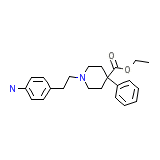Apidol




Apidol Brand names, Apidol Analogs
Apidol Brand Names Mixture
- No information avaliable
Apidol Chemical_Formula
C22H28N2O2
Apidol RX_link
No information avaliable
Apidol fda sheet
Apidol msds (material safety sheet)
Apidol Synthesis Reference
Weijlard et al., J. Am. Chem. Soc. 78, 2342 (1956)
Apidol Molecular Weight
352.47 g/mol
Apidol Melting Point
83 oC
Apidol H2O Solubility
No information avaliable
Apidol State
Solid
Apidol LogP
4.384
Apidol Dosage Forms
Liquid; Tablet
Apidol Indication
For treatment and management of pain (systemic) and for use as an anesthesia adjunct.
Apidol Pharmacology
Anileridine, a potent analgesic, is an analog of pethidine. Anileridine is useful for the relief of moderate to severe pain. It may also be used as an analgesic adjunct in general anesthesia in the same manner as meperidine to reduce the amount of anesthetic needed, to facilitate relaxation, and to reduce laryngospasm. In addition, anileridine exerts mild antihistaminic, spasmolytic and antitussive effects. Anileridine's main pharmacologic action is exerted on the CNS. Respiratory depression, when it occurs, is of shorter duration than that seen with morphine or meperidine when equipotent analgesic doses are used.
Apidol Absorption
Anileridine is absorbed by all routes of administration.
Apidol side effects and Toxicity
Symptoms of overexposure include dizziness, perspiration, a feeling of warmth, dry mouth, visual difficulty, itching, euphoria, restlessness, nervousness and excitement have been reported.
Apidol Patient Information
No information avaliable
Apidol Organisms Affected
Humans and other mammals














